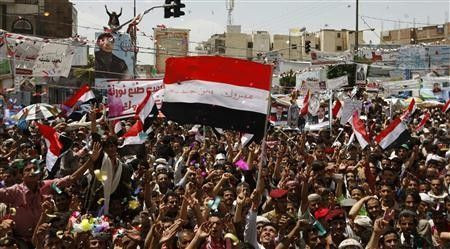Yemen's future still uncertain after Saleh's departure

After his presidential compound came under heavy attack on Sunday, Yemeni leader Ali Abdulla Saleh fled to neighboring Saudi Arabia for medical treatment, according to local media reports. Along with him, four or five top government officials are also reportedly being treated in Saudi Arabia.
The mortar shell attack occurred when Saleh and his officials were at prayer in a mosque on the compounds of the presidential palace. The attack killed seven guards on the spot.
Although there was no official confirmation on the extend of wounds he suffered, sources indicate that Saleh underwent two operations in a premium hospital in Riyadh. It has been reported that a few wooden bits got pierced into his head during the attack on his compound last week. He is slowly recuperating from the wounds sustained.
Government sources are actually looking to downplay the attack, saying that it had made the president all the more resolved to return soon and extend his stay in power. A senior minister even maintained that the president was not among those sent to Saudi Arabia, and that he is still in the country.
US government officials have said that they are working closely with the Arab nations and putting pressure on the Yemeni leader, to agree to a deal that will end the bloody campaign that lasted for more than three months. The deal proposes to give immunity to Saleh once he decides to step down.
Saudi Arabia has not yet responded officially though the present situation has put the Saudis in a spot of bother. Earlier, the Saudis had repeatedly intervened in the political scenario in Yemen and recommended Saleh to step down so as to alleviate the volatile situation.
However, experts point out that Egypt never wanted this to happen at the expense of greater anarchy in the neighboring country. But, looking at the current state of Yemen it looks imminent, unless something drastic happens in the coming days.
Vice President Abd al-Rab Mansur al-Hadi has assumed office as acting president of Yemen, but observers are not sure whether he will be able to cope with the spiralling confusion in the Muslim nation.
Meanwhile, Saleh's departure has triggered a spate of wild celebrations among the anti-government protesters. The streets are filled with people who are busy singing and dancing, while some are bursting fire crackers or slaughtering cows.
The fact is that Yemen's future is mired in sheer uncertainty. According to some experts, Saleh, if he had really left the country, could opt to come back in a bid to regain control. It would not be easy for him though, as the recovery time will be more than enough for the opposing Ahmar family and their supporters to thwart his ambitions.
The Yemeni crisis is far from being over as fighting between government security forces and the dominant tribal groups still continue in many regions. Besides, Saleh's well-armed opponents benefit from the strong leadership of a military general who decided to join the pro-democratic forces.
While many of Saleh's powerful sons and other close family members remain fully in control of the army, Saleh's reported departure will have little impact in bringing peace to the nation.
© Copyright IBTimes 2025. All rights reserved.





















